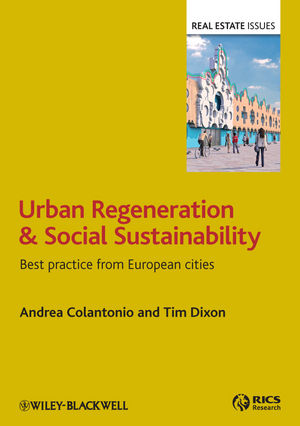Urban Regeneration and Social Sustainability: Best Practice from European CitiesISBN: 978-1-4051-9419-8
Hardcover
334 pages
December 2010, Wiley-Blackwell
 This is a Print-on-Demand title. It will be printed specifically to fill your order. Please allow an additional 10-15 days delivery time. The book is not returnable.
|
||||||
• provides a comprehensive European perspective,
comparing case studies across five cities and identifying best
practice in sustainable urban regeneration by focusing on social
sustainability
• defines and shows how social sustainability (a key aspect in sustainable development) can be assessed, measured and monitored within urban regeneration projects
• takes a real estate ‘institutional’ focus by examining the role of key stakeholders within the property development industry and the public sector
• examines detailed studies of urban regeneration projects in Spain (Sant Adria de Besos), Italy (Turin), Netherlands (Rotterdam), Germany (Leipzig), and the UK (Cardiff).
• sets the research in the context of the recent economic recession and the growth of responsible investment (RI) and corporate responsibility (CR) agendas of investors and developers.
• is based on a major three year independent, funded programme of research through the European Investment Bank’s EIBURS programme
• defines and shows how social sustainability (a key aspect in sustainable development) can be assessed, measured and monitored within urban regeneration projects
• takes a real estate ‘institutional’ focus by examining the role of key stakeholders within the property development industry and the public sector
• examines detailed studies of urban regeneration projects in Spain (Sant Adria de Besos), Italy (Turin), Netherlands (Rotterdam), Germany (Leipzig), and the UK (Cardiff).
• sets the research in the context of the recent economic recession and the growth of responsible investment (RI) and corporate responsibility (CR) agendas of investors and developers.
• is based on a major three year independent, funded programme of research through the European Investment Bank’s EIBURS programme



